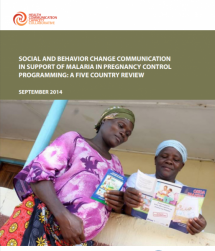SBCC in Support of Malaria in Pregnancy Control Programming: A Five Country Review
The burden of malaria has dropped significantly in the last 10 ten years. It is unfortunate that this completely preventable disease continues to exist at all, particularly among pregnant women, where malaria can have extreme consequences on both maternal and fetal outcomes. Research has shown that effective social and behavior change communication (SBCC) programs can have an impact on the uptake of malaria in pregnancy (MIP) interventions, including the use of long lasting insecticide treated nets (LLINs), taking at least three doses of intermittent preventive treatment during pregnancy (IPTp), and prompt treatment seeking behavior that utilizes rapid diagnostic tests (RDTs) and artemisinin-based combination therapies (ACTs). The extent to which SBCC for MIP is integrated into country programs, however, is unclear.
To address this issue, this review of five countries (Ghana, Liberia, Malawi, Nigeria, and Zambia) was conducted to assess the extent to which MIP SBCC guidelines have been incorporated into national strategic plans. The review collected the following strategic documents from each of the five countries as available:
• National malaria strategies
• National malaria case management documents
• National reproductive health documents
• National malaria communication strategies
• MIP guidelines and training documents
• Malaria monitoring and evaluation frameworks
Each document was reviewed for document-specific criteria that indicate the depth, harmonization, and integration of SBCC for MIP in country programs. A summary of document findings and country specific recommendations is provided for each of the five countries.
A collective summary of overarching findings that can be seen across all of the countries includes the following statements referencing SBCC for MIP in strategic documents:
1. National malaria communication strategy objectives and activities are not always consistent with those laid out in the national malaria strategic plan.
2. Strategies do not tend to segment audiences thoroughly. Service providers and those who support pregnant women are rarely mentioned.
3. Knowledge is an overly emphasized focus of SBCC efforts. Attitudinal behavioral determinants are seldom addressed. Those countries looking to conduct formative research to inform MIP priorities should assess self-efficacy, perceived risk, and social norms.
4. Country specific barriers to behaviors that prevent and control malaria in pregnancy, identified in the documents’ situation analysis, are not often addressed by SBCC strategies.
5. If and when countries’ national malaria control program and reproductive health units integrate their service providers’ training activities, documents, and supporting activities, the manner in which this occurs is not well detailed.
6. National malaria strategies do not always outline objectives that are detailed enough to guide the development of effective national communication strategies.
Source: Johns Hopkins Center for Communication Programs
Date of Publication: April 13, 2020
SIMILIAR RESOURCES
Tools
Examples
- Community Communication MNCH e-Manual: Participatory Health Promotion Sessions
- Creating Mobile Health Solutions for Behaviour Change: A Study of Eight Services in the mNutrition Initiative Portfolio
- Gender and Malaria Fact Sheet
- SBCC for Malaria in Pregnancy: Strategy Development Guidance
- FGM Infographics
- Promoting Uptake of Intermittent Preventive Treatment of Malaria in Pregnancy
- HIV and Sexual and Reproductive Health Programming: Innovative Approaches to Integrated Service Delivery
- Advocating for Change for Adolescents’ Toolkit
- Plan Stratégique National de Plaidoyer en matière de lutte contre le Paludisme (PSNPP) en Côte d'Ivoire 2018-2023
- How Should Community Health Workers in Fragile Contexts be Supported: Qualitative Evidence from Sierra Leone, Liberia and Democratic Republic of Congo

